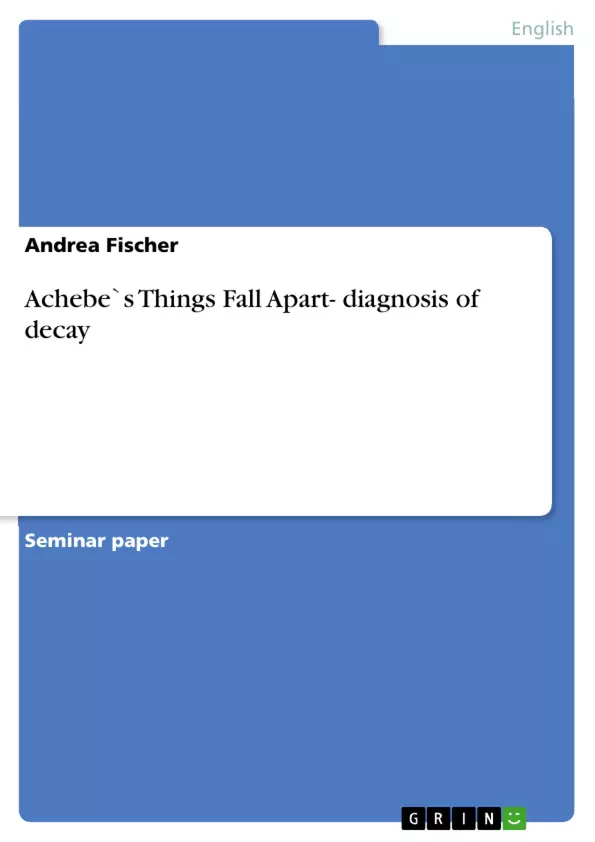Things Fall Apart is Chinua Achebe`s first novel. It is about the land of the Ibo in the eastern
region of present- day Nigeria, in the period between 1850- 1900. It is the period shortly before
and after the arrival of the white men in this part of West Africa. Achebe`s nineteenth century
Africa witnesses the end of an era and the beginning of twentieth century Europeanization,
with all its implied consequences for another stage – the future history of postcolonial Africa.
Things Fall Apart gives us a vision of the Ibo`s life in a part of Africa called Umuofia, its
history and their cultural, religious and political traditions.Also it allows us an insight into the
differences and problems between the established tradition, that is the Ibo tradition, and the
emerging traditions of the white colonizers. Things Fall Apart is not only the drama of a whole
society but it also reflects the tragedy of one man, Okonkwo that is worked out of his personal
conflicts as well as out of the contrariness of his destiny. This novel shows the changes which
have taken place in Ibo as a result of the encounter between Europe and Africa during the
imperial-colonial period.
Things Fall Apart consists of three parts: the first part is set in Umuofia before the arrival of
the white men. In the second part, the protagonist`s, Okonkwo`s, banishment from Umuofia to
Mbanta is dramatized and the arrival of the white men is reported. The third section shows the
tragic fall of Okonkwo and the decay of the old ways of life in Ibo society.
In my essay I want to discuss wether Achebe`s novel is a diagnosis of decay or rather a report
on Modernization. In my first section I want to give a short insight into the traditional Ibo
society. The second part will focus on the thematic of decay, both for the society as well as for
Okonkwo. In my next part I will concentrate on aspects of Modernization. In the last part of
this essay I will try bring this novel in a broader context and will try to examine the aspects of
decay and Modernization on the basis of Foucault`s discourse theory and therefore his theory
on Modernization.
Table of Contents
- Introduction
- The traditional Ibo society and Okonkwo
- Achebe's Things Fall Apart as a diagnosis of decay
- Decay of the traditional Ibo society
- Okonkwo's downfall
- Achebe's Things Fall Apart as a report on Modernization
- Achebe's Things Fall Apart in the context of Foucault's discourse Theory
- Conclusion
Objectives and Key Themes
This essay examines Chinua Achebe's novel Things Fall Apart, exploring its depiction of pre-colonial Ibo society and the impact of European colonization on its traditional values and structures. It aims to analyze whether the novel is primarily a diagnosis of the decay of traditional Ibo society or a report on the process of modernization.
- The traditional Ibo society and its cultural values
- The arrival of European colonizers and its impact on Ibo society
- Okonkwo as a representative figure of traditional Ibo values
- The complex interplay of decay and modernization in the novel
- The application of Foucault's discourse theory to understand the process of modernization in the context of colonial Africa
Chapter Summaries
The first chapter of Things Fall Apart introduces the traditional Ibo society in the village of Umuofia, highlighting their customs, beliefs, and social structures. It focuses on Okonkwo, a respected warrior and a strong embodiment of traditional Ibo values, demonstrating the importance of individual strength, honor, and community integration.
The subsequent chapters delve into the complexities of Ibo society, exploring both the positive aspects of their communal life and the potentially cruel consequences of their traditional laws and religious practices. The story delves into Okonkwo's personal journey, highlighting his struggles with his own flaws and the conflicting demands of his individual ambitions and societal expectations.
The narrative then shifts to the arrival of European missionaries and the gradual encroachment of Western influence on the Ibo community. We see the conflict between traditional Ibo ways of life and the new ideologies brought by the colonizers, exploring how these changes affect individual lives and the social fabric of the community.
Keywords
Key terms and concepts explored in this work include: Ibo society, traditional values, colonization, modernization, decay, Okonkwo, cultural conflict, Foucault's discourse theory, postcolonialism, African literature, identity.
Frequently Asked Questions
What is the main theme of Chinua Achebe's "Things Fall Apart"?
The novel depicts the traditional Ibo society in Nigeria and the tragic impact of European colonization on its cultural and social structures.
Is "Things Fall Apart" a story of decay or modernization?
The essay discusses whether the novel serves as a diagnosis of the decay of traditional society or a report on the inevitable process of modernization.
Who is Okonkwo in the context of the novel?
Okonkwo is the protagonist and a respected warrior who represents traditional Ibo values; his downfall symbolizes the collapse of the old way of life.
How does the arrival of white men change Umuofia?
Their arrival introduces new religious, political, and social ideologies that clash with and eventually dismantle the established Ibo traditions.
What theoretical framework is used to analyze the novel in this essay?
The essay applies Michel Foucault’s discourse theory to examine the aspects of modernization and societal change within the text.
- Quote paper
- Andrea Fischer (Author), 2003, Achebe`s Things Fall Apart- diagnosis of decay, Munich, GRIN Verlag, https://www.grin.com/document/19238



